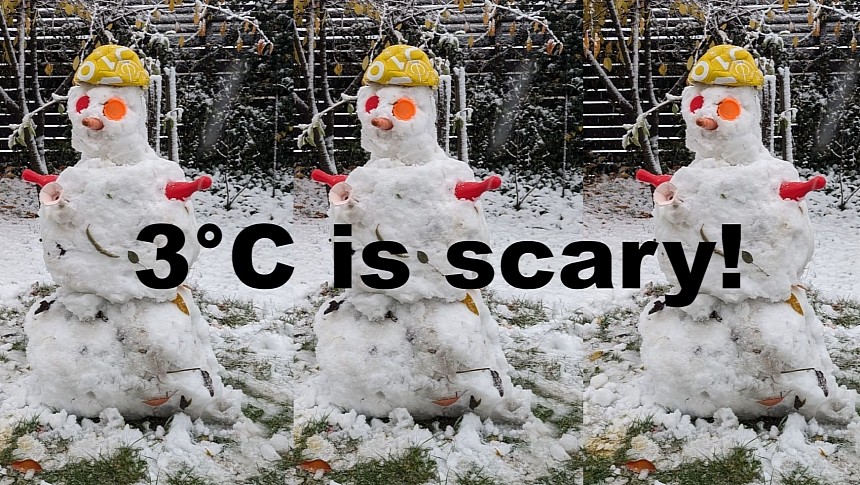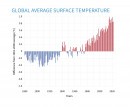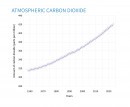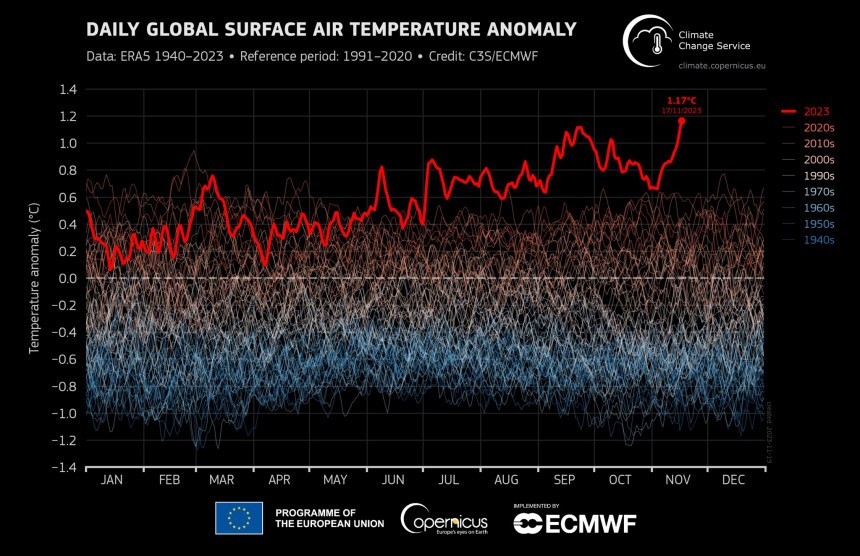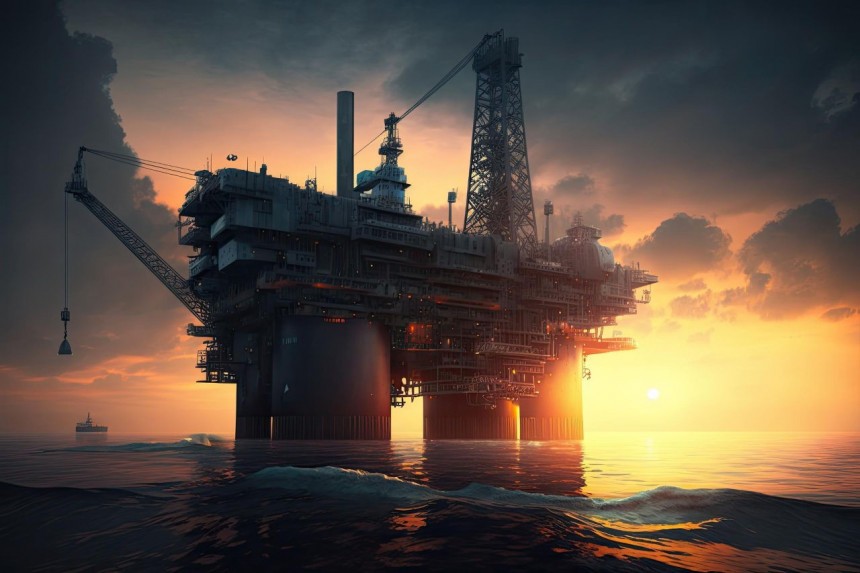I'm looking out the window at the horrible snowman I made with my little daughter a few hours ago. It's already melting, and the snow layer that formed overnight is thinner by the minute. I predict that by the evening, no sign of snow will be left, as the winter temperatures are rapidly rising to autumn levels today. So, maybe the 2-degree scenario is actually the optimistic one.
Do you remember "the Paris Agreement" or the COP 21 (the UN Climate Change Conference in 2015)? I do. That's because around eight years ago, I became interested in climate change and how internal combustion engine vehicles and fossil fuel usage impact global warming and the future of humankind on this planet.
So, why do you think you should bother reading this piece? Ladies and gentlemen, we have officially entered what I call "the 2-degree era" (sorry if someone else used that before; I don't need credits for this syntax, trust me).
Scientists estimate that in the mid-1800s when the Industrial Revolution started, global average temperature hovered around 13.7°C. It doesn't seem much, but scientists believe a mean global temperature over 16°C would be near-catastrophic for humankind and most biodiversity.
That's why at COP 21 in Paris in December 2015, almost all the leaders in the world, representing 197 countries, pledged to reduce pollution and emissions and even pursue efforts to limit the rise in temperature to only 1.5°C above pre-industrial levels this century.
Right.
Damn coincidence, the same year, the concentration of carbon dioxide in the atmosphere broke a new record, nearing 400 ppm (parts per million). Why is the CO2 important? Because it drives global warming. The more CO2 in the air, the warmer the planet's surface gets. Simple as that.
For instance, in 1880, when mean global temperatures record-keeping started, the value was roughly 13.5°C, while the concentration of carbon dioxide in the atmosphere is estimated at around 280 ppm or even less.
One hundred thirty-five years later, by the time leaders of the world gathered in Paris in 2015 and made all those green(washing) promises, the CO2 concentration levels spiked by more than 100 ppm to 399.4 ppm, while the global average temperature rose by more than one degree, reaching 14.8°C.
Simple math suggests that CO2 levels grew by a mere 0.8-0.9 ppm yearly, while temperature increase was only 0.01°C annually. But you would be wrong to think that CO2 concentration and temperature increase are linear. Very wrong.
In fact, since the 1980s, the rate of warming doubled because we started to use much more coal, oil, and gas than before. Last year, in 2022, CO2 levels reached a new high of 417 ppm, while the global average surface temperature was 1.06°C warmer than the pre-industrial period.
These data suggest that we're very close to reaching the limit of 1.5°C above pre-industrial levels, and this will most likely happen before 2050 if the rate of warming stays the same or even accelerates. Of course, it also means that there's an increased risk of being unable to keep temperatures rising below 2°C above pre-industrial levels until 2100.
But, if you're one of the naysayers, you didn't bother reading this article. And you probably couldn't care less that November 17 was a historical day: that Friday was the first day when measured global temperature was more than 2°C (more precisely, 2.06°C) above pre-industrial levels a century and a half ago.
Well, the "good" news gets even "better," as it seems that this particular day was warmer than the average temperature in the 1991-2020 period by 1.17°C. Let me repeat: more than one degree Celsius compared to the previous 30 years' average temperature. Does it ring a bell? It should.
It signals that we're speeding up to reaching the 1.5°C milestone much sooner than any realistic prediction. While one swallow does not make a summer, the UN's recent Emissions Gap Report backs up the idea that Paris Agreement objectives won't be met and we won't be able to limit warming to 2°C above pre-industrial levels.
Just picture this: theoretically, we could limit global warming to 1.5°C above pre-industrial levels if we cut emissions by 42% by 2030. Which is if the world's Top Five biggest polluters (China, the US, India, Russia, and Japan) would become non-polluters in the next six years. Yes, it's impossible, you're right.
Based on the current situation, the UN estimates that in the best-case scenario, we have a chance to limit the global temperature increase to 2.5°C ("a catastrophic scenario" according to climate experts), while the realistic scenario is a 2.9°C increase of global temperature above pre-industrial levels by 2100.
I don't know if there's a comprehensible term beyond "catastrophic" to describe this two-point-nine scenario.
It will be presided over by Sultan Al Jaber, the Adnoc (Abu Dhabi National Oil Company) CEO, which has the most extensive oil and gas investment plan of any company in the world. No, really, this is not a joke, not even a bad one.
In fact, while at COP28, nations should agree to cut as much as possible fossil fuel use and instead triple renewable energy, the oil&gas industry, backed by many banks and also an important number of governments, plans to exploit far more coal, oil, and gas reserves than the "carbon budget" allows.
According to the UN, fossil fuel producers' plans "would blow the planet's carbon budget twice over." To limit the global temperature increase to only 2°C, scientists estimated in 2015, at COP 21 Paris, that we can release no more than one trillion tonnes of carbon into the atmosphere by 2030.
Today, we have already consumed 60% of that carbon budget, and emissions are not expected to decrease in the following years sharply. Experts call it "insanity." The oil and gas industry calls it "business as usual" because it relies on carbon capture.
According to lobbyists, capturing the carbon released by exploring and burning fossil fuels will make this industry carbon-neutral or even zero-emissions. This is greenwashing level 999, as the International Energy Agency explains in its recent report "The Oil and Gas Industry in Net Zero Transitions."
In the "1.5°C" scenario, the industry should capture around 32 billion tonnes of carbon by 2050. This would require more electricity than the entire world's electricity demand today. Can you imagine such a scenario where every source of electricity is directed to fossil fuel emissions capture? I'll let you find a better word than "insanity" for this one.
When I was her age, I made snowmen from the beginning of November to the middle of March. I enjoyed several months of winter, not two or three weeks, if you sum up all the snowy days, like in the last decade.
Summers were hot when I was her age, but they didn't last that long like in the last decade. Also, rainy days were somehow constant throughout the year. Floods, wildfires, or devastating storms were rare, but in the previous decade, they became the norm in most parts of the world.
When I was her age, I didn't know about pollution, CO2 emissions, or global warming. But today, we know. And we also know the very root of these problems: burning fossil fuels to produce energy, move our vehicles, cool and warm our houses.
However, I don't know how to explain to her that I don't know how to stop global warming, I don't have the means to stop the oil and gas industry from pursuing their plans, and I don't have a backup plan for a more-than-two-degree world.
But you know what? None of these matter because she put the finger on a more stringent matter: "Daddy, you really suck at making snowmen!" Just like the oil industry really sucks at making us believe they're part of the solution, I may add.
So, why do you think you should bother reading this piece? Ladies and gentlemen, we have officially entered what I call "the 2-degree era" (sorry if someone else used that before; I don't need credits for this syntax, trust me).
Two degrees don't seem much, but they mean a lot
For those of you who still don't know what "2°C" stands for, it means that the average temperature on the globe should not rise more than two degrees from the "pre-industrial levels" – that is compared to the period around 150 years ago when scientists started measuring temperatures on the planet.Scientists estimate that in the mid-1800s when the Industrial Revolution started, global average temperature hovered around 13.7°C. It doesn't seem much, but scientists believe a mean global temperature over 16°C would be near-catastrophic for humankind and most biodiversity.
Right.
Damn coincidence, the same year, the concentration of carbon dioxide in the atmosphere broke a new record, nearing 400 ppm (parts per million). Why is the CO2 important? Because it drives global warming. The more CO2 in the air, the warmer the planet's surface gets. Simple as that.
For instance, in 1880, when mean global temperatures record-keeping started, the value was roughly 13.5°C, while the concentration of carbon dioxide in the atmosphere is estimated at around 280 ppm or even less.
One hundred thirty-five years later, by the time leaders of the world gathered in Paris in 2015 and made all those green(washing) promises, the CO2 concentration levels spiked by more than 100 ppm to 399.4 ppm, while the global average temperature rose by more than one degree, reaching 14.8°C.
Simple math suggests that CO2 levels grew by a mere 0.8-0.9 ppm yearly, while temperature increase was only 0.01°C annually. But you would be wrong to think that CO2 concentration and temperature increase are linear. Very wrong.
These data suggest that we're very close to reaching the limit of 1.5°C above pre-industrial levels, and this will most likely happen before 2050 if the rate of warming stays the same or even accelerates. Of course, it also means that there's an increased risk of being unable to keep temperatures rising below 2°C above pre-industrial levels until 2100.
2°C is history. Let's make it 2.5°C. Or even 2.9°C
Nowadays, all the millions of hours of work and billions of data translated by thousands of scientists into relevant info for politicians and the large public are easily trashed by a few viral social media posts denying climate change or the influence of human-caused CO2 (by burning large amounts of fossil fuels) to global warming.But, if you're one of the naysayers, you didn't bother reading this article. And you probably couldn't care less that November 17 was a historical day: that Friday was the first day when measured global temperature was more than 2°C (more precisely, 2.06°C) above pre-industrial levels a century and a half ago.
It signals that we're speeding up to reaching the 1.5°C milestone much sooner than any realistic prediction. While one swallow does not make a summer, the UN's recent Emissions Gap Report backs up the idea that Paris Agreement objectives won't be met and we won't be able to limit warming to 2°C above pre-industrial levels.
Just picture this: theoretically, we could limit global warming to 1.5°C above pre-industrial levels if we cut emissions by 42% by 2030. Which is if the world's Top Five biggest polluters (China, the US, India, Russia, and Japan) would become non-polluters in the next six years. Yes, it's impossible, you're right.
I don't know if there's a comprehensible term beyond "catastrophic" to describe this two-point-nine scenario.
The COP28 will save us all. Just kiddin'
Everybody likes jokes, but I doubt anyone is amused when the trick's on you. For instance, the 28th UN Climate Change Conference will start in Dubai in a few days. Yes, that Dubai from the United Arab Emirates, which is one of the biggest oil producers in the world.It will be presided over by Sultan Al Jaber, the Adnoc (Abu Dhabi National Oil Company) CEO, which has the most extensive oil and gas investment plan of any company in the world. No, really, this is not a joke, not even a bad one.
In fact, while at COP28, nations should agree to cut as much as possible fossil fuel use and instead triple renewable energy, the oil&gas industry, backed by many banks and also an important number of governments, plans to exploit far more coal, oil, and gas reserves than the "carbon budget" allows.
Today, we have already consumed 60% of that carbon budget, and emissions are not expected to decrease in the following years sharply. Experts call it "insanity." The oil and gas industry calls it "business as usual" because it relies on carbon capture.
According to lobbyists, capturing the carbon released by exploring and burning fossil fuels will make this industry carbon-neutral or even zero-emissions. This is greenwashing level 999, as the International Energy Agency explains in its recent report "The Oil and Gas Industry in Net Zero Transitions."
In the "1.5°C" scenario, the industry should capture around 32 billion tonnes of carbon by 2050. This would require more electricity than the entire world's electricity demand today. Can you imagine such a scenario where every source of electricity is directed to fossil fuel emissions capture? I'll let you find a better word than "insanity" for this one.
There's no closure yet
Maybe I'm biased. My daughter was born on Earth Day, on April 22. It's hard for me to explain to a for-and-a-half-year-old kid that I currently experience climate change.When I was her age, I made snowmen from the beginning of November to the middle of March. I enjoyed several months of winter, not two or three weeks, if you sum up all the snowy days, like in the last decade.
Summers were hot when I was her age, but they didn't last that long like in the last decade. Also, rainy days were somehow constant throughout the year. Floods, wildfires, or devastating storms were rare, but in the previous decade, they became the norm in most parts of the world.
When I was her age, I didn't know about pollution, CO2 emissions, or global warming. But today, we know. And we also know the very root of these problems: burning fossil fuels to produce energy, move our vehicles, cool and warm our houses.
However, I don't know how to explain to her that I don't know how to stop global warming, I don't have the means to stop the oil and gas industry from pursuing their plans, and I don't have a backup plan for a more-than-two-degree world.
